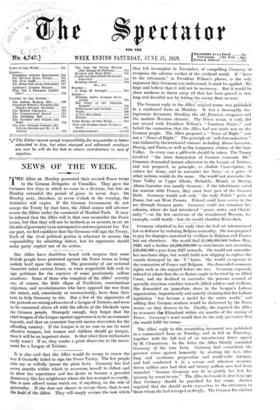The German reply to the Allies' original terms was pUblialled
in a condensed form on Monday. It was a thoroughly die- ingenuous document, blending the old ?mission arrogance and the modern Marxian rhetoric. The Peace terms, it said, did not accord with President Wilson's Fourteen Points," and belied the contention that the Allies had not made war on the German people. The Allies proposes! a " Peace of Might " and not a " Peace of Right." The principle of " self-determination was violated by the territorial cessions including Alsace-Lorraine, Slesvig, and Posen, as well as the temporary cession of the Saar Valley. In every case a plebiscite should be taken. The Treaty involved " the utter destruction of German economic life." Germany demanded instant admission to the League of Nations, and was prepared, in principle, to abolish Conscription, to reduce her Army, and to surrender her Navy—at a price—if other nations would do the same. She would not sumnder the. Saar Valley or Upper Silesia, Malmedy, Memel, or Danzig. Alsace-Lorraine was mostly German ; if the inhabitants voted for reunion with France, they must bear part of the (fennel' Debt. Germany would cede only the truly Polish " parts of PoSen, but not West Prussia. Poland could have access to the 1:380. through German ports. Germany could not renounce her colonies, where she had introduced " peace, order, and Christi • unity "—as the few survivors of the slaughtered Wearers, for example, could testify—but she would abandon Klee-chair.






































